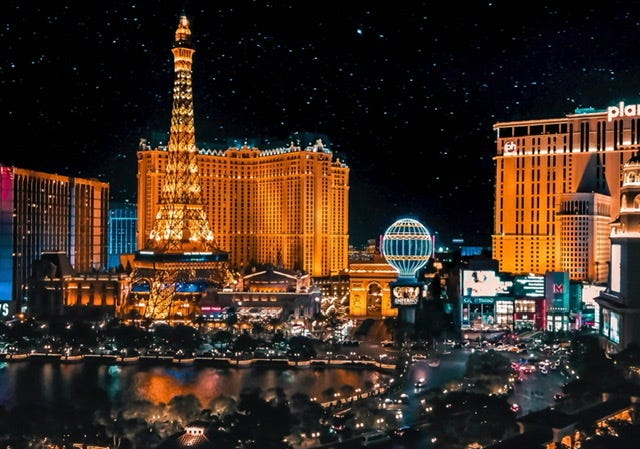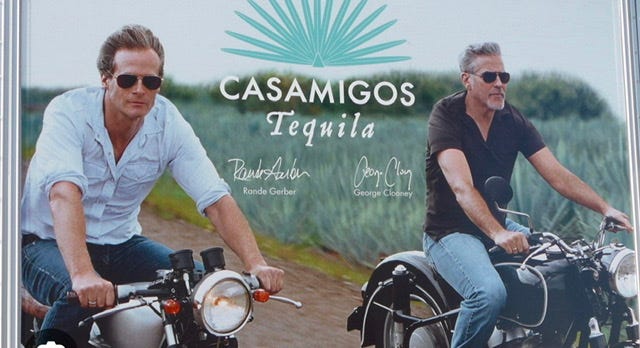On Las Vegas and America
Sin City is becoming more like everywhere else, and vice-versa. That's good for Vegas and bad for the United States
But it’s a dry civilizational collapse.
Last week I flew to Las Vegas to play in “The Main” - the signature event of the World Series of Poker, where players put down $10,000 to seek a first prize that this year is $12.1 million.
The tournament is still going, without me. I finished about 1600th of the 10,043 players, just short of the money line. (I didn’t spend $10,000, I won my way in for $430, so I didn’t feel so bad.)
Outside, the temperatures were close to 110, not that anyone at the tables would know. The Las Vegas Strip is among earth’s most engineered environments, a four-mile stretch of gambling palaces that keep the heat out and the money in. It is almost a shock to walk a few blocks from the Strip and see desert sand in the empty lots waiting to become hotels.
—
(Yes, that’s the desert)
—
I’ve visited Vegas to play cards at least a dozen times since the 1990s, watching the Strip grow bigger and fancier year by year. A generation ago, the casino companies built themed hotels to evoke other places - New York, Paris, Egypt, Venice.
But the Strip no longer needs to pretend to be anywhere else, or to offer dancing fountains or white tigers as an excuse to visit. The newest, most expensive resorts - the Wynn, the Aria, the Cosmopolitan - are sleek glass towers filled with high-end shopping and restaurants. And tables with eye-wateringly high per-minimum bets.
To travel to Vegas in 2023 is to realize how mainstreamed gambling has become.
Only a few years ago, professional sports leagues avoided gambling in general and Las Vegas in particular. They feared fans would think the games were fixed. Now the leagues have not just dropped those scruples but gone the other way. The biggest Strip draw last week was not poker but the National Basketball Association’s summer league for young players.
—
(TAKE A SHOT ON ME! IT’S ONLY $6 A MONTH)
—
The new acceptance is not limited to sports betting.
About 1,000 commercial and 500 more tribal casinos now operate in 44 states. Commercial casino revenue nationally topped $60 billion in 2022, almost double its 2010 level. For all its opulence, the Strip generated less than 15 percent of that revenue. Meanwhile, state governments offer shiny scratch-off games at every gas station and billion-dollar lottery jackpots that make the World Series of Poker’s top prize a rounding error.
Including state lotteries and tribal casinos, Americans now spend over $130 billion a year gambling. Even investing feels more like gambling than it ever has, thanks to low-cost online trading and Bitcoin.
—
I obviously don’t have any moral objection to gambling.
But, just like drugs and alcohol, its cousins in addiction, gambling eats people. Not everyone. Not even close to everyone. But lots of people.
Spend any amount of time in a casino and you’ll see the victims, the dead-eyed man trying credit cards at an ATM until he finds one that works, the woman slumped against a wall moaning to herself - not the angry sobs of love lost, but the quiet half-dry cries of what have I done with the mortgage money?
Las Vegas has its virtues. Casinos are labor-intensive service businesses, and the big hotels are all unionized (with two exceptions that are now almost certain to join the ranks). As a result, the industry provides middle-class jobs to about 40,000 workers on the Strip alone, many of whom don’t have or need college degrees. And Vegas’s spectacle can be exciting even for non-gamblers - though even on the fanciest stretches of the Strip one has to ignore the obvious desperation.
But as a country we were probably better off when Las Vegas was an island in Mojave desert, a place people had to seek out. We were probably better off when people had to find gambling for themselves instead of seeing ads for it every time they turned on what my son used to call “sportathons.”
Ditto cannabis and alcohol.
—
(Tequila and motorcycles! Who needs a helmet? Not your favorite ER doctor, that’s for sure!)
—
Ditto prescription drugs too, I think, not just the fun ones, but especially the fun ones.
I know the First Amendment effectively makes any restrictions on advertising impossible. And if it’s legal, and can be advertised, and there’s money to be made on it, it will be. And if your friendly state government can get a share of the cash, sooner or later it will find its way to a city or convenience store near you. But our poor monkey brains weren’t built to handle all these dopamine drips.
We were probably better off when we had some legal and societal barriers to all the fun stuff. The societal barriers were probably more important. They always are.
Nothing’s free. It’s just a matter of who pays.






And yet prior to Bill Clinton’s signature in 1996, prescription drugs were not allowed to be advertised to the general public, only to doctors in professional journals. Thanks Bill, for groveling before Big Pharma and unleashing the shameless mess we have today.
Gambling is a serious addiction that nobody talks about.